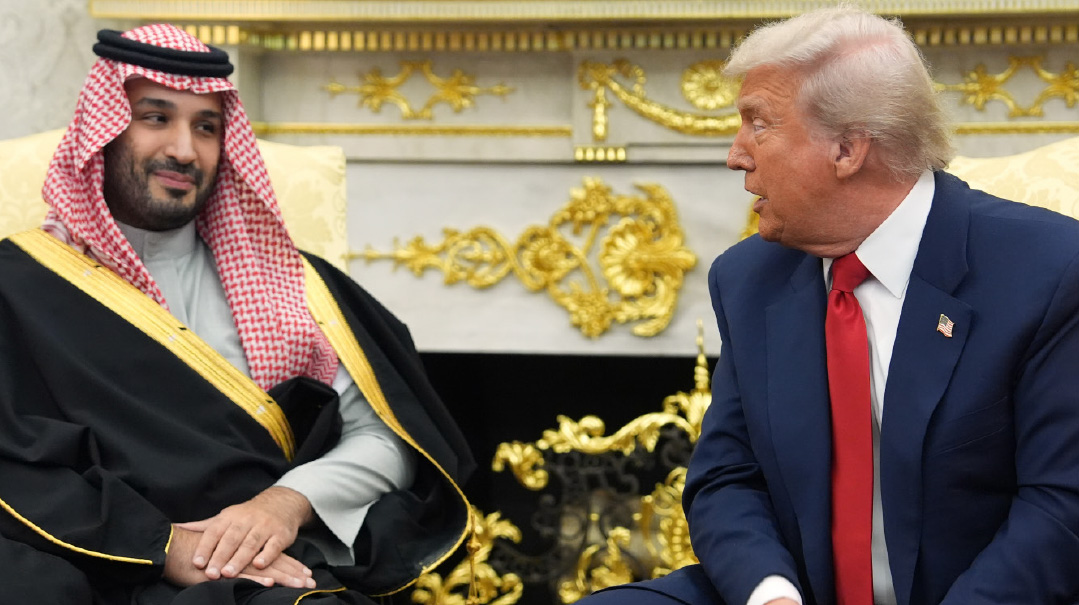Passion Matters More than Cash

Before making America great, Trump must make it solvent

Photo: AP Images
You can buy a lot of weapons and pay a lot of soldiers with $895 billion.
The outgoing Congress ratified that princely sum last week when it passed the National Defense Authorization Act (NDAA) for 2025. It is a preliminary step in setting next year’s national security priorities, and facilitates legislative oversight of the Department of Defense, which is part of the executive branch.
The $895 billion will not be spent until the incoming Congress passes a separate appropriations bill, so the amount is not yet etched in stone. Aside from reiterating America’s longstanding commitment to maintaining Israel’s qualitative military edge over its adversaries, and increased vigilance and spending to deter Iran and China, the NDAA, as currently worded, provides several goodies for Israel and food for thought for its enemies.
Two key security priorities include an additional $30 million in aid to Israel to improve the IDF’s technical wherewithal to detect and destroy enemy tunnels and to fund yearly joint subterranean military drills between Israeli and US forces, to stop terrorists from using tunnels for military purposes and smuggling. A third new proposal calls on President Trump’s new “envoy for hostage affairs” to devise a proactive strategy to protect Americans from being taken hostage or otherwise unlawfully detained when overseas.
Matthew Kenney, vice president for government affairs at the Jewish Institute for National Security of America (JINSA), noted that this policy change is long overdue, following a 175 percent increase in the number of US citizens taken captive abroad in the last decade. Previous administrations’ policy “has often exacerbated this trend, rewarding hostage-takers with political and monetary concessions instead of deterring and penalizing them. There is an urgent need to change course to avoid more Americans being taken hostage.”
The NDAA also pulls the plug on the fanciful Biden administration program that provided $320 million to facilitate humanitarian aid to Gaza, via a floating dock that broke apart in typical summer Mediterranean winds; and asks the new secretary of defense to review the operational value of America’s air base in Qatar in light of that country providing safe harbor to Hamas leadership, and to evaluate the effect on the US Air Force if it redeployed its base elsewhere.
Watch to see if Pete Hegseth wins confirmation as defense secretary. In his 2020 book American Crusade, Hegseth criticized Qatar for funding left-wing institutions in the US.
Hegseth and some of the other Trump nominees will promote policy changes. Congress will give them more money to achieve their goals than it has ever allocated to national defense, yet all the money won’t buy victories until the US can erase its biggest weaknesses.
Defining Victory and Defeat
America is grappling with two gaping financial deficits. Its cumulative national debt for decades of spending way above what it receives in revenues is $36 trillion and counting. The nation’s annual budget runs a $2 trillion deficit. But its worst deficit is a “deficit of passion” that puts Western countries at a decided disadvantage when battling fiercely passionate enemies motivated by nationalist or religious zeal.
Professor David Betz, who holds the attention-grabbing title of “professor of war in the modern world” at King’s College in London, coined the term “deficit of passion.” For his 2015 book, Carnage and Connectivity, he borrowed that expression from the early 19th-century Prussian general and military theorist Carl von Clausewitz, who wrote that “passion,” “chance,” and “political purpose” drive the vicissitudes (fluctuations) of war.
James Farwell, a national security expert and strategic communication specialist, reviewed Betz’s Carnage and Connectivity for the US Army War College Quarterly in July 2016 and reached some alarming conclusions. At the time, President Obama was nearing the end of his second term, and his policy was to wage war with a minimum of bloodshed through drone and air strikes and few or no boots on the ground, which produced only illusory victories.
“Defeating the enemy kinetically in a battlespace does not necessarily equal winning. Winning requires the enemy to recognize it has been defeated and to subject itself to the victor’s will,” Farwell wrote. “The West may have bigger, more high-tech weapons, but as the wars in Iraq and Afghanistan have demonstrated, these cannot compensate for the passion that motivates enemies comprised of moderately organized and loosely affiliated non-state groups… Intensely motivated, purposeful enemies using low-tech methods can still defeat high-tech opponents.”
Make America Solvent First
So while it’s encouraging to see America’s defense blueprint with a significant pro-Israel component — and support from the incoming Trump administration and Congress under Republican control should augment the plan — you can’t throw money at problems, as Ronald Reagan used to say; and you can’t defeat jihadists without matching their passion, ounce for ounce, as Clausewitz might have said.
Israel declared that it was fighting a war for its survival following Hamas’s October 7 invasion and massacre. So there should be no lack of passion — but how else can you explain the erratic execution of the war and all of its stops and starts? Indeed, the constraints placed on the Netanyahu government by both the Biden administration and domestic pressures from Israel’s sizable, vocal, and still powerful political left have played a role, not to mention the agonizing moral bind gripping Israel in how to deal with its hostage dilemma.
Despite the challenges, Israel’s military achievements have been impressive, especially in taking the military initiative to secure its interests in Syria after the Assad regime collapsed.
Israel can’t afford any slack in dealing with terrorist groups with a surplus of passion who glorify death and destruction and for whom no sacrifice is too great to make for their cause.
On the surface, the incoming Trump administration’s policy of picking its fights and keeping the US out of foreign conflicts that don’t serve its interests seems prudent. But how do America’s enemies and rivals view this policy? Do they detect a deficit of passion that they can exploit?
This remains to be seen. However, the US must tackle its financial deficits if it hopes to remain strong. In another report, “Wars and Stupid Wars,” which Professor Betz authored in February 2024 for the Danube Institute, he noted that American debt had grown to unsustainable levels, placing it in serious financial peril.
As of two years ago, America’s debt-to-GDP ratio was 129 percent and was on a ballistic trajectory to reach 225 percent by 2050, although he said that the numbers will never rise to that height because the system will collapse first: “As it was put to me by a former senior banker and diplomat, ‘It can’t happen, as investors won’t accept it. This sort of thing normally ends in hyperinflation, conflict, and loss of empire!’ ”
Republicans are enthusiastic about retaking power in Washington. Still, squabbles over spending — not just military spending — have consumed much of the oxygen on Capitol Hill as the 118th Congress took its last breaths before adjourning for the year-end holidays.
If Trump hopes to make America great again, he’s got to make it financially solvent first.
(Originally featured in Mishpacha, Issue 1042)
Oops! We could not locate your form.







